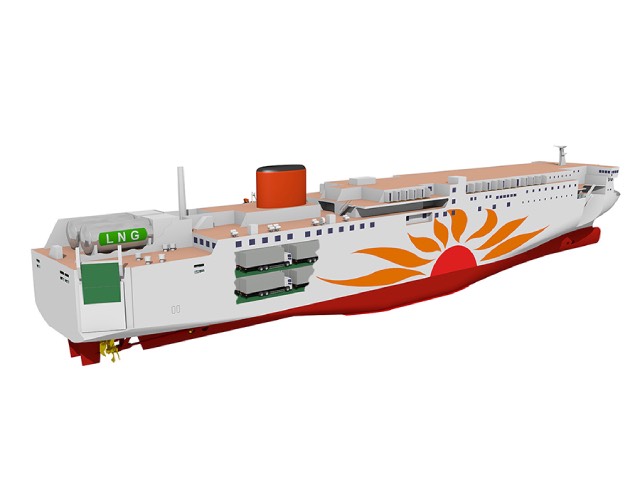— Two Vessels to Be Successively Completed and Delivered by 2023 —
・ Applying technologies accumulated in LNG vessels to build LNG-fueled ferries
・ Compared to conventional marine fuel oil, CO2 emissions per unit heat capacity are to be reduced more than 20% lower, with virtually no SOx emissions
Mitsubishi Shipbuilding Co., Ltd., a Group company of Mitsubishi Heavy Industries, Ltd. (MHI) based in Yokohama, has concluded a contract with Mitsui O.S.K. Lines (MOL) to build two LNG-fueled ferries, the first such project in Japan. These vessels will be built at the Shimonoseki Shipyard & Machinery Works, with successive completion and handover scheduled for the end of 2022 to early 2023. Ferry Sunflower Limited based in Oita, will operate the ferries on its Osaka-Beppu route.
The ferries will be about 199.9m long and 28.0m wide, with gross tonnage of approximately 17,300 tonnes. They will have maximum prescribed capacity for 763 passengers, and carrying capacity for around 136 13-meter trucks and 100 passenger cars. The main power plant will be a high-performance dual-fuel engine able to operate on both liquefied natural gas (LNG) and A‐type heavy oil, the first for a Japanese ferry. These engines will provide exceptional environmental performance, with a 20% reduction in carbon dioxide (CO2) emissions compared to existing vessels and virtually eliminating sulfur oxide (SOx) emissions, reducing the environmental load.
Carrying capacity for trucks has also been significantly increased compared to existing vessels, with an expanded driver’s lounge and more area per passenger. The ferries will meet the need for a modal shift in transportation and represent an evolution in casual cruising, with relaxed and open public spaces including an expanded bath and restaurant, and an atrium extending through three floors.
Going forward, Mitsubishi Shipbuilding will continue to construct passenger‐cargo ships and transport vessels to support the steady operation of customers, and by providing technologies to reduce the environmental load will work together with its customers to solve their diverse challenges, vitalize maritime transportation, and contribute to environmental protection.









































